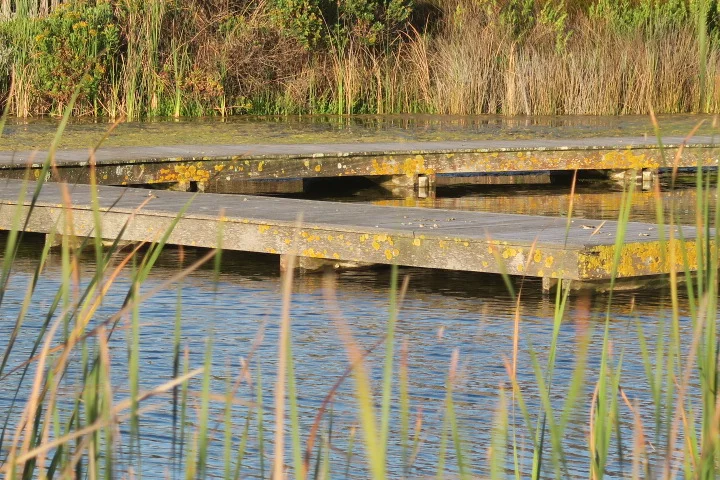Pic notes: My papa grew these beautiful spuds. And that emerald lawn? The eastern Free State in high summer, with magnificent storms every afternoon.
I wanted to write a post about being water-wise in the kitchen. I took photos. Food was involved. It was pretty cheerful. And I will write that post, and soon.
But today's post has to be reserved, first and foremost, for a HUGE GREAT BIG GUSHING THANK-YOU to the Groenland Water Users Association (GWUA), farmers who released water from the dams in their catchment area into the Cape Town reservoir system. The reasons they were able to do so are complex – read about it here. But the bottom line is that they didn’t have to make this extraordinary gesture; they are reducing their “water insurance” – their ability to be resilient in the face of drought – for the benefit of their urban neighbours.
One result is that Day Zero has been pushed out by three weeks – incredibly precious time that will give us a bit more chance to prepare. Businesses and schools will be able to stay open for just a little longer. It will take us that much closer to the time the winter rains might start falling.
I’m trying hard not to be scoldy or finger-wagging in these blogs, although there are moments when my temper gets away from me. But a few things are bothering me, and I have to get them off my chest.
First, what are WE doing to meet the farmers at least half-way? Even if we’ve all been living in cloud-cuckooland for the past decades, years and months, we’ve known Day Zero was a stark reality since 18 January, the Day The City Woke Up (Way Too Bloody Late). Why hasn’t our usage been significantly reduced since then? We’re still way over the limits set if we’re going to make it through the rest of the year. Is this because of the panic (and illegal) buying of municipal water, all those people getting Jojo tanks and hastily filling them up with hosepipes? Yes, those of you buying massive tanks which remain mysteriously unattached to your gutters: We see you.
I don't see any downpipes going into that tank...
Is it because we’re just not bothering to save water? That we think there will always be a heroic bunch of farmers to ride to our rescue so that we can go on punching dials on our washing machines and topping up our pools?
I rent a home in a sort of double complex – a retirement village within a security estate. Imagine my horror on getting, on the same day, a letter from the village administration reprimanding us for remaining way above, on average, the 87 litres per day per person (we’re now supposed to be on 50 l per day!); and another from the estate to remind us that tankers delivering water may only do so between 8 and 5. I can understand why a family with small children might struggle to to use less than 50 litres a day, but retirees? Unless someone needs home nursing, surely 87 litres a day is crazy lavish? And doesn’t everyone know by now that it’s illegal to sell water, and you might as well be taking deliveries from your cocaine dealer?
Is it that we just don’t know what to do? Goodness knows, there’s been very little guidance from the powers that be. We’re all being told to save water, but us helpless middle-classes are not being told HOW. Or, if we are, this isn’t being tailored to need and circumstance. I got a rather endearing mail from a group of “60 to 70-yr-old women” eager for tips that don’t involve heaving buckets. (Fear not, I have MANY ideas for you.)
The next thing that has my jaw swinging: the amount of aggression and resentment I see online towards the agricultural sector and its water consumption. To read some commentators, you’d think agriculture was an unnecessary indulgence. Good people: WHO DO YOU THINK PROVIDES THE FOOD ON OUR FRIGGING PLATES? (sorry/not sorry). Once more, for those at the back: food is not mysteriously conjured out of thin air and a few barrels of chemicals in factories, from whence it lands magically in shops. Nearly every single thing you eat began its existence in a farmer’s field, even if big business has subsequently added a ton of additives and packaging. No farming = no food.
Besides, what are farmers supposed to do? Watch their flock of sheep die of thirst? The orchards their grandparents’ parents nurtured wither up? It’s the lack of imagination that bothers me: the water crisis has cost between 30 and 50 000 job losses in agriculture alone. That’s up to 50 000 families – unlikely to have reserves or resources to fall back on – sans income. Children going hungry. I find it hard to forgive the City and national government that consequence of their dual mismanagement. And with our pools and multiple bathrooms, some of us are still whining about water going to agriculture, as if it was some sort of optional extra.
(There are far more expert and experienced people than me writing about this sort of thing at the moment: please follow, for starters, urban strategist Jodi Allemeier on Twitter (@urbanjodi) for sophisticated and realistic analysis of the water crisis, especially the impact on jobs. And this is a piece on gardens and so much more, by the brilliant Rupert Koopman (@RK_ct), that everyone needs to read. And there are many others who’ve been speaking out on these and related issues for years, unlike newbie me. Do send me your best links providing intelligent insight on the crisis.)
We’ve been given an extraordinarily precious gift from the farmers: not just water, but a tiny bit more space to install rain-harvesting devices, to learn new skills, to purchase water-saving gadgets like camping showers, water filters and more. (If you’re like me, there’s no way you can buy all of these in one go.) Now it’s time to do our part.
This raises a sticky, if interesting problem: how DO we get, erm, selfish people to save water? Been brainstorming this with a friend who had a relative buy a huge water tank specifically so he could fill it with municipal water ahead of Day Zero. Tank Dude saw nothing wrong with this. His family finally managed to get him to understand how and why this constituted immoral behaviour.
At the same time, my academic colleagues are tearing their hair out over the influx of students starting the new academic year, especially those from elsewhere in SA, who are utterly unconvinced of the urgency of the crisis. At orientation, one lecturer informed her class that they would need to shower only every second day. She had a near-riot on her hands, with many in her audience loudly reiterating that they would be exercising their right to shower every single day.
So I've been talking to folk about psych strategies for getting people to change their behaviour, and they fall roughly into three categories: shaming them; making the change cool; and rewarding them. So: sticks, carrots and basic advertising.
Shaming is tricky territory, and maybe some earnest conversations are needed, as with Tank Dude and his relatives; a lot of folk are not evil, they just haven't really imagined the consequences of their behaviour. The more subtle form of shaming is basically the same as advertising: modelling "best" behaviour so that it becomes the "in thing" to do. I met a lovely first-year student at UCT who's going to walk to the Newlands spring with her water container on an adapted wheeled suitcase, who'll be setting a loud buzzing timer for her showers, making it a point of honour to keep wearing the same clothes, and generally showing her fellows that water-wise is hip. It's become cool in London to take your own travel mug into coffee-shops; we need to make these and lots of other water-conserving strategies cool. Finally, carrots: how about the Cape universities set their residences up in a weekly or monthly competition: whichever uses the least water per person gets a pizza or ice-cream party?
So I managed to get to food in at the end. And once again, Groenland farmers: we are beyond grateful. I am personally so thankful that I am going to share a pic of my three-legged cat with you, as a special reward. Dankie, enkosi, thank you.















